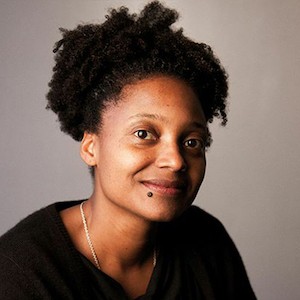Alumni Spotlight: Tracy K. Smith '97
The Alumni Spotlight is a place to hear from the School of the Arts alumni community about their journeys as artists and creators.
Tracy K. Smith '97 is the author of three books of poetry: Life on Mars, which received the 2012 Pulitzer Prize; Duende, recipient of the 2006 James Laughlin Award, and The Body's Question, which won the 2002 Cave Canem Poetry Prize. Smith is also the recipient of a 2004 Rona Jaffe Award and a 2005 Whiting Award. She was the Literature protégé in 2009-2011 cycle of the Rolex Mentor and Protégé Arts Initiative. From 1997 to 1999 Smith was a Stegner Fellow in poetry at Stanford University. She has taught at the City University of New York, the University of Pittsburgh and Columbia University, and is currently Assistant Professor of Creative Writing at the Lewis Center for the Arts at Princeton University.

Was there a specific faculty member or peer who especially inspired you while at the School of the Arts? If so, who and how?
I feel lucky in that many of my School of the Arts faculty were supportive and available during my time as a student. I think often of Lucille Clifton's workshop, and her willingness to talk about her own life, and the experiences that led to many of her great poems. Mark Doty was a generous and galvanizing force for my classmates and me. And Linda Gregg modeled the life of someone who lived 100% of the time as a poet. But I think Lucie Brock-Broido '82 gave the most to us over those two years. She was like a poetry enchantress, inspiring my classmates and me to sense and seek the true magic and mystery to which poetry gives access. She guided us to think deeply about the structure and organization of the books we read, as a way of thinking about the books we were trying to write.
How did attending the School of the Arts impact your work and career as an artist?
It gave me a lifelong community of fellow-poets. And those are the people who have remained my readers, friends and confidants. They're the ones whose belief encouraged me to keep writing even when I wasn't sure that my efforts would result in anything ever.
What were the most pressing social/political issues on the minds of the students when you were here?
I was a student in the mid 90s, when politics and poetry didn't seem to mix much. We were worried about ourselves, about growing up and making lives as artists after Columbia. But this was also the moment when demands for diversity were reaching the poetry establishment. Two years after I graduated, Lucille Clifton was elected as a Chancellor of the Academy of American Poets. Cave Canem was founded. And publishers were beginning to become much more aware of and interested in a far broader range of voices. Something like a much-needed Revolution happened in American Poetry, the fruits of which we are still enjoying today.
What were the first steps you took after graduating?
I received a Stegner Fellowship, so I moved back home to California and enrolled in the workshops at Stanford. My classmates that first year were Quan Barry, Mark Wunderlich '94, Monica Youn and Hugh Behm-Steinberg. After that, I meandered a while. I got my first teaching job in 2001.
What advice would you give to recent graduates?
Your classmates will be some of your best allies during what might be your "lean years." Be supportive of them, share resources and opportunities, invest in their success and allow them to do the same for you. My journey to publishing a first book felt interminably long when I was living it, but in retrospect, it was necessary. I needed to get past the poems I was writing as a student and discover what my genuine questions and beliefs as an artist were going to be. I'm glad I didn't rush that process.